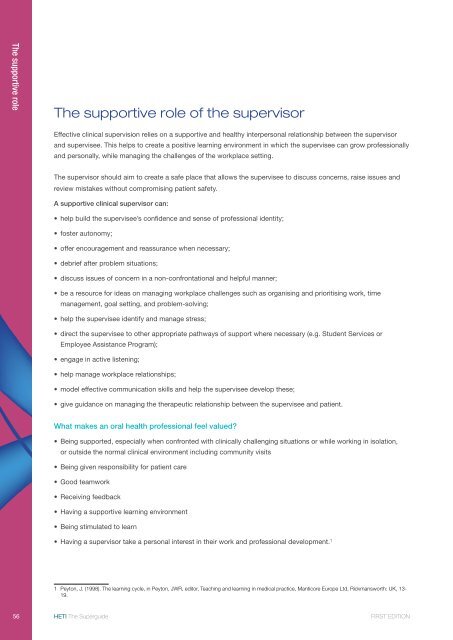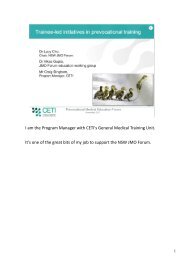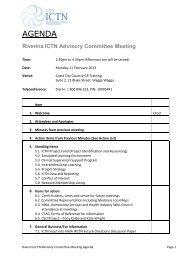Open - HETI - NSW Government
Open - HETI - NSW Government
Open - HETI - NSW Government
- No tags were found...
Create successful ePaper yourself
Turn your PDF publications into a flip-book with our unique Google optimized e-Paper software.
The supportive roleThe supportive role of the supervisorEffective clinical supervision relies on a supportive and healthy interpersonal relationship between the supervisorand supervisee. This helps to create a positive learning environment in which the supervisee can grow professionallyand personally, while managing the challenges of the workplace setting.The supervisor should aim to create a safe place that allows the supervisee to discuss concerns, raise issues andreview mistakes without compromising patient safety.A supportive clinical supervisor can:• help build the supervisee’s confidence and sense of professional identity;• foster autonomy;• offer encouragement and reassurance when necessary;• debrief after problem situations;• discuss issues of concern in a non-confrontational and helpful manner;• be a resource for ideas on managing workplace challenges such as organising and prioritising work, timemanagement, goal setting, and problem-solving;• help the supervisee identify and manage stress;• direct the supervisee to other appropriate pathways of support where necessary (e.g. Student Services orEmployee Assistance Program);• engage in active listening;• help manage workplace relationships;• model effective communication skills and help the supervisee develop these;• give guidance on managing the therapeutic relationship between the supervisee and patient.What makes an oral health professional feel valued?• Being supported, especially when confronted with clinically challenging situations or while working in isolation,or outside the normal clinical environment including community visits• Being given responsibility for patient care• Good teamwork• Receiving feedback• Having a supportive learning environment• Being stimulated to learn• Having a supervisor take a personal interest in their work and professional development. 11 Peyton, J. (1998). The learning cycle, in Peyton, JWR, editor, Teaching and learning in medical practice, Manticore Europe Ltd, Rickmansworth: UK, 13-19.56 <strong>HETI</strong> The Superguide FIRST EDITION
















